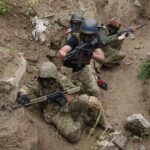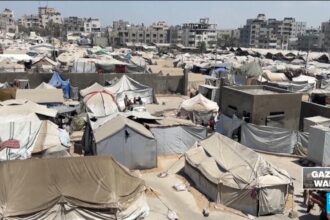In a devastating escalation of Gaza’s humanitarian crisis, Israeli forces opened fire Thursday on Palestinian civilians gathering for desperately needed food aid, killing at least 38 people and wounding over 200 others, according to local health officials. The incident occurred in northern Gaza City, where thousands had assembled at a designated distribution point following days without access to basic supplies.
“People were just trying to feed their families,” said Omar Khalidi, a local resident who witnessed the chaos. “We’ve been without bread for days. Children are starving. Then suddenly, there was gunfire everywhere.”
The Israeli military claims their forces responded to “perceived threats” when the crowd allegedly approached a security perimeter, but multiple eyewitness accounts and video footage suggest the gathering was peaceful until the shooting began. This contradictory narrative has intensified international scrutiny of Israel’s conduct in the ongoing conflict, which has now lasted more than nine months.
UN humanitarian coordinator James Reynolds called the incident “absolutely unacceptable” and demanded an immediate independent investigation. “Access to food is a fundamental human right. Civilians seeking humanitarian assistance must never be targeted,” he stated in an emergency briefing.
The shooting compounds an already dire situation in Gaza, where the World Food Programme reports approximately 700,000 people face “catastrophic levels of hunger.” Aid organizations have repeatedly warned that distribution channels remain severely restricted despite court orders and diplomatic pressure to increase humanitarian access.
Canadian Foreign Affairs Minister issued a statement expressing “deep concern” and calling for “full compliance with international humanitarian law,” while opposition leaders demanded stronger government condemnation of the attack. The incident has sparked renewed debates in Canadian politics about Canada’s stance on the conflict.
Medical facilities in Gaza, already overwhelmed and under-resourced, struggled to treat the influx of wounded. Dr. Amira Saleh from Al-Shifa Hospital described the situation as “beyond our capacity,” with critical shortages of pain medication, antibiotics, and surgical supplies.
The shooting has prompted emergency sessions at the United Nations Security Council and renewed calls from human rights organizations for accountability. Amnesty International characterized the incident as potentially constituting “a war crime that demands immediate investigation.”
As night fell over Gaza, families continued searching for missing relatives amid the chaos. The incident represents one of the deadliest single attacks on civilians seeking humanitarian aid since the conflict began last October.
What remains to be seen is whether this tragedy will finally catalyze meaningful changes to humanitarian access protocols, or if it will become yet another grim statistic in a war where civilian protection increasingly appears an afterthought rather than a priority.
























